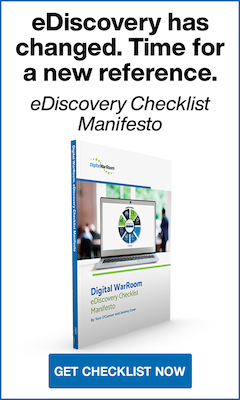Vetting ediscovery companies can be a daunting task. As your matter case load and the size of matters increases, the gravity of the decision could demand that more stakeholders play a role in the selection process. As an ediscovery software vendor ourselves, we've seen many approaches to the selection of legal vendors. One tidbit we always like to include is YMMV - Your mileage may vary. While we can speak at a high level about our features, pricing, support and how we differentiate ourselves, the reality is that all law firms have their own unique needs. We highly recommend taking a step back to assess the needs of the case and potential future cases. Depending on whether you require a point solution, a couple specific features, or a full suite of offerings, a live demo and 1 hour of your time should be considered a minimum to begin to grasp the capabilities of a given e discovery software offering.
1) Determine High-Level Needs
Determine key use cases, desired workflows, and create a shortlist of features needed to complete your project. Digital WarRoom covers the stages of processing, review and production of electronic documents which includes the ability to ingest data to batch documents, filter metadata, search keyword terms and export productions in industry-standard load file format. Ediscovery tools covering this functionality are commonly referred to as document review tools because over 75% of the work on an eDiscovery project is usually spent during the review phase. Keep in mind that there are other eDiscovery vendors that specialize in different phases, such as preservation, collection or even trial presentation. Take notes of your needs and ensure you are using the right terminology to find a solution for your unique needs. For the purposes of this article, we'll assume you are looking for doc review technology.
What do you need to know about your own firm before deciding on an ediscovery company?
2) Determine Litigation Readiness
Take stock of the team that will be involved in the eDiscovery process for your law firm. How many users will need access to each matter? Does the review team have prior experience with other tools? Knowledge and proficiency with legal technology is now an attorney requirement according to ABA rule 1.1 [Comment 8]. We recognize that eDiscovery training can be an ongoing process. In cases where the team is accustomed to legacy workflows and is just now beginning to incorporate ediscovery software, ease of use and access to quality support may become higher priority.
3) Determine Caseload
Consider the number of matters your law firm would like to host as well as the estimated data size of each matter. If you expect that your law firm's e discovery practice may scale up and add more matters in the future, this could be something to consider. While many legal vendors calculate costs in different ways, data and case sizes are good leading indicators of costs. Knowing your electronic data is an important step to inform your team and prepare for data processing, early case assessment, and document review setup.
4) Determine Price Sensitivity
Price is often a sizeable factor when selecting a vendor. Gather ballpark numbers for how costs will compare in your unique situation across several vendors. Not all ediscovery vendors publish their pricing publically, so you may need to dig deeper or reach out to a point of contact. Digital WarRoom has our full pricing information tables available here. In general, the time you spend selecting a legal technology vendor should be proportional to your anticipated costs. High costs? Consider a more rigorous vetting process. Single matter under 25 GBs of data? Boot up a Digital WarRoom single matter for $250 and try it out.
5) Compare Features
A typical electronic discovery platform will include the following and should be considered a base requirement for technology to review electronic data.
a) Processing - Expand PST and ZIP files, Deduping, DeNisting, File Extension Culling, Index/OCR for keywords/filtering, ingest load files.
b) Review - Tools and reports for early case assessment, search, sort, view documents, mark, redact, create privilege logs
c) Production - Native production, generate TIFF images, Endorse, Bates stamp. export production with industry-standard load file format
Different features may be more or less valued across different law firms. Pay attention to the interface and discovery workflow associated with each phase and find an e discovery company that best fits your own needs. Are your requirements static or flexible? E discovery technology like Digital WarRoom allows for flexibility in your workflow and leaves data and information management decisions up to the end-user.
6) Consider Policies For Cost Recovery
Cost recovery is now widely accepted and considered standard for recovering ediscovery software fees. If your law firm does not have specific cost recovery policies in place, consider implementing them, or use your technology solution to help guide the creation of those policies. An easy way to recover costs is through a Single Matter type subscription. Each invoice corresponds to one matter. Digital WarRoom takes it a step further. We provide an additional software tool called Management Console which tracks all matter metrics live, giving legal professionals all the tools to keep their clients informed and manage expectations.
Conclusion
There you have it- 6 strategies for selecting an ediscovery vendor. Digital WarRoom has senior consultants standing by to answer your questions and schedule a 1 hour production demonstration. We'd be happy to discuss any and all of the points in this article and help you meet your requirements. Schedule a Demo
-1.png?width=400&height=164&name=DWRLogoClassic%20-%20Copy%20(2)-1.png)









Comment On This Article